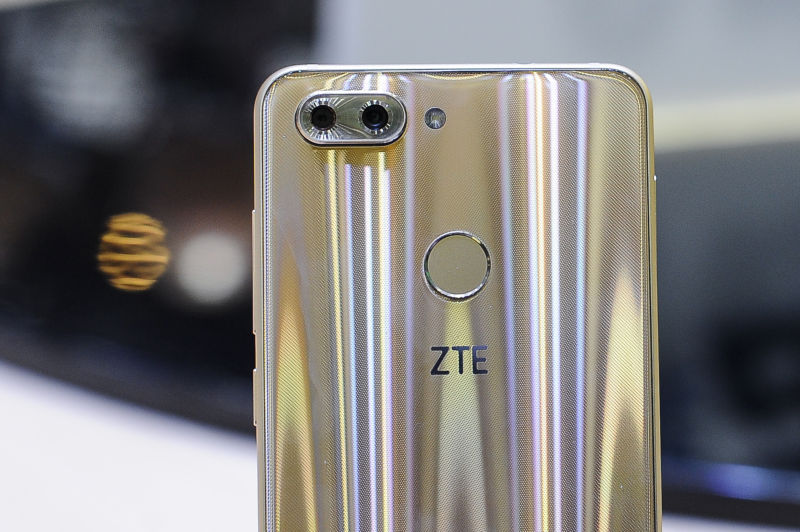Gasi se Kineski ZTE zbog Američkih sankcija
Page 1 of 1
 Gasi se Kineski ZTE zbog Američkih sankcija
Gasi se Kineski ZTE zbog Američkih sankcija
The Trump administration just forced smartphone maker ZTE to shut down

Enlarge / New ZTE Blade V9 at a ZTE stand during the Mobile World Congress Day 2 on February 27, 2018 in Barcelona, Spain.
[url=https://www.gettyimages.com/search/photographer?mediatype=photography&phrase=joan cros&photographer=nurphoto&sort=mostpopular]Joan Cros/NurPhoto via Getty Images[/url]
One of the leading Chinese smartphone makers, ZTE, is shutting down global operations in the face of crippling sanctions levied by the US government. ZTE is China's number-two smartphone maker, and as recently as last year it was the number-four smartphone vendor in the US.
"The major operating activities of the Company have ceased," ZTE wrote (PDF) in a Wednesday announcement to stock market traders in Hong Kong.
ZTE's business became untenable after a US government order banned American companies from exporting technology to the Chinese smartphone maker. ZTE is heavily dependent on US-made components, especially Qualcomm chips and Google's Android software stack.
Last year, ZTE admitted to an elaborate multi-year scheme to sell US-made technology to Iran and North Korea in violation of US sanctions laws. ZTE paid $890 million in penalties and said it was in the process of disciplining dozens of senior company officials who had orchestrated a scheme to violate US sanctions laws.
But last month the Trump administration accused ZTE of continuing to lie to the US government even after last year's guilty plea. The company told the US government that the guilty executives had received letters of reprimand and had had their 2016 bonuses reduced. But the US now says that was a lie—many of the employees received full bonuses, and they didn't receive letters of reprimand until early 2018—after the US government challenged ZTE on the issue.
In the April 15 order activating the export ban against ZTE, US Commerce Department official Richard Majauskas wrote that ZTE had demonstrated a "pattern of deception, false statements, and repeated violations." A July 2017 letter to US officials was "brimming with false statements," he said.
Since 2011, Majauskas argued, ZTE had "employed multiple strategies in an attempt to conceal and obscure the true nature and extent of the company's role" in transactions that moved US-made technology to Iran and North Korea. "As a result of the conspiracy, ZTE was able to obtain hundreds of millions of dollars in contracts with and sales from Iranian entities to ship routers, microprocessors, and servers" that were subject to US export restrictions.
So on April 15, the US Commerce Department invoked the nuclear option, banning US companies from doing business with ZTE.
Unfortunately for ZTE, US-made hardware and software are a huge part of ZTE's products. According to Reuters, at least 25 percent of the components in ZTE's phones came from US companies. ZTE makes heavy use of Qualcomm chips for its smartphones and other products.
Even worse, the export ban included Google's suite of standard Android apps. While the Android operating system itself is open source, Google has maintained control over apps like Google Maps and, most importantly, the Play Store. Outside of China, it's difficult to sell an Android phone without access to Google's app store.
Now it appears that ZTE is on the verge of going out of business altogether. ZTE says it is "actively communicating with the relevant US government departments" to negotiate a reversal of the export ban. But it's hard to imagine the Trump administration reversing course at this point. And ZTE would need to redesign many of its products from scratch to manufacture them without US-made chips or software.
ZTE's demise is the latest sign of a deepening trade rift between the United States and China, with information technology being a particular flashpoint. China's other leading smartphone maker, Huawei, has struggled to make deals with US wireless carriers due to pressure from US regulators worried about national security. And in the last year, the Trump administration has blocked at least two deals that would have put US semiconductor firms under the control of Chinese companies.
Chinese President Xi Jinping has responded by calling on China to become more self-sufficient in information technology.
ZTE apparently couldn't continue without Qualcomm chips and Android software.
Timothy B. Lee - 5/9/2018, 11:28 PM
Enlarge / New ZTE Blade V9 at a ZTE stand during the Mobile World Congress Day 2 on February 27, 2018 in Barcelona, Spain.
[url=https://www.gettyimages.com/search/photographer?mediatype=photography&phrase=joan cros&photographer=nurphoto&sort=mostpopular]Joan Cros/NurPhoto via Getty Images[/url]
One of the leading Chinese smartphone makers, ZTE, is shutting down global operations in the face of crippling sanctions levied by the US government. ZTE is China's number-two smartphone maker, and as recently as last year it was the number-four smartphone vendor in the US.
"The major operating activities of the Company have ceased," ZTE wrote (PDF) in a Wednesday announcement to stock market traders in Hong Kong.
ZTE's business became untenable after a US government order banned American companies from exporting technology to the Chinese smartphone maker. ZTE is heavily dependent on US-made components, especially Qualcomm chips and Google's Android software stack.
Last year, ZTE admitted to an elaborate multi-year scheme to sell US-made technology to Iran and North Korea in violation of US sanctions laws. ZTE paid $890 million in penalties and said it was in the process of disciplining dozens of senior company officials who had orchestrated a scheme to violate US sanctions laws.
But last month the Trump administration accused ZTE of continuing to lie to the US government even after last year's guilty plea. The company told the US government that the guilty executives had received letters of reprimand and had had their 2016 bonuses reduced. But the US now says that was a lie—many of the employees received full bonuses, and they didn't receive letters of reprimand until early 2018—after the US government challenged ZTE on the issue.
In the April 15 order activating the export ban against ZTE, US Commerce Department official Richard Majauskas wrote that ZTE had demonstrated a "pattern of deception, false statements, and repeated violations." A July 2017 letter to US officials was "brimming with false statements," he said.
Since 2011, Majauskas argued, ZTE had "employed multiple strategies in an attempt to conceal and obscure the true nature and extent of the company's role" in transactions that moved US-made technology to Iran and North Korea. "As a result of the conspiracy, ZTE was able to obtain hundreds of millions of dollars in contracts with and sales from Iranian entities to ship routers, microprocessors, and servers" that were subject to US export restrictions.
So on April 15, the US Commerce Department invoked the nuclear option, banning US companies from doing business with ZTE.
Unfortunately for ZTE, US-made hardware and software are a huge part of ZTE's products. According to Reuters, at least 25 percent of the components in ZTE's phones came from US companies. ZTE makes heavy use of Qualcomm chips for its smartphones and other products.
Even worse, the export ban included Google's suite of standard Android apps. While the Android operating system itself is open source, Google has maintained control over apps like Google Maps and, most importantly, the Play Store. Outside of China, it's difficult to sell an Android phone without access to Google's app store.
Now it appears that ZTE is on the verge of going out of business altogether. ZTE says it is "actively communicating with the relevant US government departments" to negotiate a reversal of the export ban. But it's hard to imagine the Trump administration reversing course at this point. And ZTE would need to redesign many of its products from scratch to manufacture them without US-made chips or software.
ZTE's demise is the latest sign of a deepening trade rift between the United States and China, with information technology being a particular flashpoint. China's other leading smartphone maker, Huawei, has struggled to make deals with US wireless carriers due to pressure from US regulators worried about national security. And in the last year, the Trump administration has blocked at least two deals that would have put US semiconductor firms under the control of Chinese companies.
Chinese President Xi Jinping has responded by calling on China to become more self-sufficient in information technology.

Hektorović- Posts : 26373
2018-04-10
 Re: Gasi se Kineski ZTE zbog Američkih sankcija
Re: Gasi se Kineski ZTE zbog Američkih sankcija
Prvi mi je smartphone bio neki ZTE. Koje smeće.

Trinity-

Posts : 12923
2014-04-17
 Re: Gasi se Kineski ZTE zbog Američkih sankcija
Re: Gasi se Kineski ZTE zbog Američkih sankcija
ZTE sam imala prije sadasnjeg mobitela... uzela na preplatu s garancijom na 2 godine a izdryao jedva godinu dana...
niti su mi htjeli dati zamjenski mob, niti prekinuti naplacivanje preplate... rate idu , moj mobitel ne radi... morala kupiti novi o svom trosku
i treba ih ugasiti kao i operatere koji se sluze takvim podvalama
niti su mi htjeli dati zamjenski mob, niti prekinuti naplacivanje preplate... rate idu , moj mobitel ne radi... morala kupiti novi o svom trosku
i treba ih ugasiti kao i operatere koji se sluze takvim podvalama
_________________
Bože čuvaj svoj narod u cijelom svijetu.
Daj da na vrijeme razotkriveni i pokošeni budu mučitelji naši i krvnici.

immortal-

Posts : 23285
2014-04-16
Lokacija: : CROATIA
 Re: Gasi se Kineski ZTE zbog Američkih sankcija
Re: Gasi se Kineski ZTE zbog Američkih sankcija
Nema tog ZTE odavno...
_________________
Danas Matko sutra svatko

n_razbojnik-

Posts : 11441
2014-04-15
Lokacija: : ObiLand
 Re: Gasi se Kineski ZTE zbog Američkih sankcija
Re: Gasi se Kineski ZTE zbog Američkih sankcija
samo su ljude izvarali
_________________
Bože čuvaj svoj narod u cijelom svijetu.
Daj da na vrijeme razotkriveni i pokošeni budu mučitelji naši i krvnici.

immortal-

Posts : 23285
2014-04-16
Lokacija: : CROATIA
 Re: Gasi se Kineski ZTE zbog Američkih sankcija
Re: Gasi se Kineski ZTE zbog Američkih sankcija
Američki predsjednik Donald Trump rekao je u nedjelju da s kineskim kolegom Xi Jinpingom radi na rješenju koje će golemoj kineskoj telekomunikacijskoj kompaniji ZTE-u koja je pod američkim sankcijama, omogućiti “brz nastavak poslovanja”.
“(Američko) Ministarstvo trgovine dobilo je naredbu da to omogući!”, objavio je na Twitteru američki predsjednik u vezi s rješenjem za ZTE čije je poslovanje ozbiljno narušila odluka koju je Trumpova administracija donijela sredinom travnja o sedmogodišnjoj zabrani izvoza američkih dijelova toj telekomunikacijskoj kompaniji.
Čini se da je američki predsjednik ovime najavio otvaranje u vezi s pitanjem ZTE-a ocijenivši da je zbog te krize “izgubljeno previše radnih mjesta u Kini”.
U srijedu je ZTE koji je 2017. ostvario promet od 108 milijarda dolara, objavio da je “prekinuo glavnu djelatnost” nakon američke odluke koja ugrožava i sam opstanak kompanije.
ZTE, najveća tvrtka za razvoj infrastrukture 5G (superbrzi mobilni internet) u Kini, s više od 74.000 zaposlenih, veoma je ovisna o elektroničkim dijelovima koje kupuje u SAD-u.
Američka administracija optužuje ZTE da nije poštovala trgovinski embargo, zbog čega su joj uvedene sankcije.
Slučaj ZTE se događa dok vlada napetost između SAD-a i Kine i prijeti trgovinski rat dviju zemalja zbog mogućih američkih carina, dok je SAD nezadovoljan prije svega zbog izdašnih subvencija kineske države strateškim sektorima.
“(Američko) Ministarstvo trgovine dobilo je naredbu da to omogući!”, objavio je na Twitteru američki predsjednik u vezi s rješenjem za ZTE čije je poslovanje ozbiljno narušila odluka koju je Trumpova administracija donijela sredinom travnja o sedmogodišnjoj zabrani izvoza američkih dijelova toj telekomunikacijskoj kompaniji.
Čini se da je američki predsjednik ovime najavio otvaranje u vezi s pitanjem ZTE-a ocijenivši da je zbog te krize “izgubljeno previše radnih mjesta u Kini”.
U srijedu je ZTE koji je 2017. ostvario promet od 108 milijarda dolara, objavio da je “prekinuo glavnu djelatnost” nakon američke odluke koja ugrožava i sam opstanak kompanije.
ZTE, najveća tvrtka za razvoj infrastrukture 5G (superbrzi mobilni internet) u Kini, s više od 74.000 zaposlenih, veoma je ovisna o elektroničkim dijelovima koje kupuje u SAD-u.
Američka administracija optužuje ZTE da nije poštovala trgovinski embargo, zbog čega su joj uvedene sankcije.
Slučaj ZTE se događa dok vlada napetost između SAD-a i Kine i prijeti trgovinski rat dviju zemalja zbog mogućih američkih carina, dok je SAD nezadovoljan prije svega zbog izdašnih subvencija kineske države strateškim sektorima.

Hektorović- Posts : 26373
2018-04-10
 Re: Gasi se Kineski ZTE zbog Američkih sankcija
Re: Gasi se Kineski ZTE zbog Američkih sankcija
President Xi of China, and I, are working together to give massive Chinese phone company, ZTE, a way to get back into business, fast. Too many jobs in China lost. Commerce Department has been instructed to get it done!
— Donald J. Trump (@realDonaldTrump) 13. svibnja 2018.

Hektorović- Posts : 26373
2018-04-10
 Similar topics
Similar topics» Indija će kupiti ruske S-400 i pod prijetnjom američkih sankcija
» Pokret socijalista pokrenuo peticiju za osudu američkih sankcija Vulinu
» Kina razmatra mehanizam zaštite njihove imovine od američkih sankcija
» DF traži ostavku tuzlanske vlade nakon američkih sankcija Mirsadu Kukiću
» Izetbegović zbog islamizma pod pratnjom američkih službi
» Pokret socijalista pokrenuo peticiju za osudu američkih sankcija Vulinu
» Kina razmatra mehanizam zaštite njihove imovine od američkih sankcija
» DF traži ostavku tuzlanske vlade nakon američkih sankcija Mirsadu Kukiću
» Izetbegović zbog islamizma pod pratnjom američkih službi
Page 1 of 1
Permissions in this forum:
You cannot reply to topics in this forum
 Events
Events Latest images
Latest images
 by
by 
